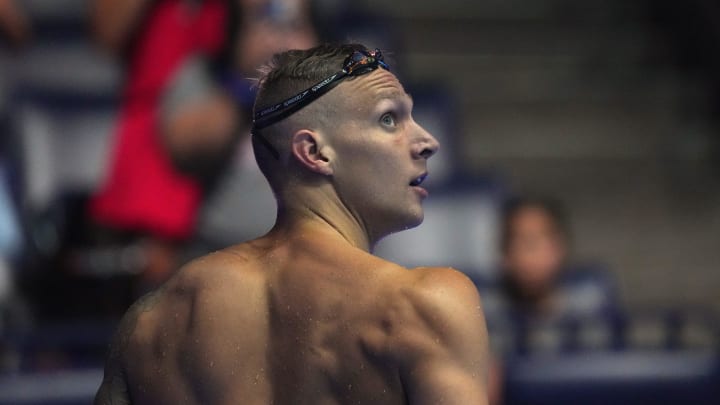Caeleb Dressel, Katie Ledecky Offer Different Mindsets in Battle Against Time
Pat Forde

Heading into big meets, swimmers notoriously lie to themselves. The internal dialogue says that a lifetime-best performance is coming, that their training has led them to the point where they’ll inevitably see a number flash on the scoreboard next to their names that they’ve never produced before.
It isn’t always a lie, of course. But it’s never always true, and the lies can become more brazen as swimmers get older. Believing that a new level of greatness is always within reach is a powerful drug.
Which is why Caeleb Dressel startled a room full of reporters with an honest admission Saturday night at the U.S. Olympic Trials in Indianapolis.
“I don’t know if I’ll ever go a best time ever again,” Dressel said. “That’s hard to say out loud.”
Compare and contrast that with the words three years ago from another all-time great who is, like Dressel, 27 years old.
“I’m always striving to be better than I’ve ever been, and it’s not easy when your times are world records,” Katie Ledecky said during the Tokyo Olympics. “I’m really tough on myself. But that’s the attitude I have—I literally approach each race with a belief that I can swim a best time, and that’s pretty darned tough. But that’s why I’ve been so successful over the years, because I approach every single race with the attitude that anything can happen, and I can break world records this race. I’m going to step up and throw down. It’s a real blessing and a curse to have that attitude.”
Both are legends in the sport who are chasing their own greatness, trying to catch up to times that were achieved at younger ages. Realistic or futile, that’s always the goal.
After a very successful meet here, winning two events and making an Olympic relay in a third, Dressel is closer to his younger self. He’s trying to dial back to the prime years of 2019–21, when he was breaking world and American records.
His winning time in the 100 butterfly Saturday was only .32 off what he did in Omaha three years ago at Trials, and it vaults him near the top of the crowded world rankings in that event heading into Paris. In the 50 free, Dressel’s 21.41 is .37 off his 2021 Trials time and fourth in the world. His 100 freestyle time that landed him in third was about half a second off his American record, but more significantly it was behind two other American young guns—Jack Alexy and Chris Guiliano—who claimed the individual spots in that event and relegated Dressel to the relay.
“I am happy with a lot of my swims, and to be back to a place that I wanted to be with the sport is exceptional,” he said. “I’m really proud of myself for that. So I don't know if I have one swim in particular, but getting that weight off my shoulders for 100 free, making the team, it made the rest of the week a little easier and bittersweet, because I got third. But with Jack and Chris, I mean, they deserve that spot. I got beat.”
Ledecky also had a successful meet, winning four events and extending her unprecedented dominance in distance freestyle events. While her excellence should never be taken for granted, her times at Lucas Oil Stadium weren’t dazzling. And they got comparatively slower as the meet went along.
She started with a 3:58.35 in the 400 freestyle, which was three seconds faster than she was at Olympic Trials in 2021 and only two seconds off her American record from 2016. Next up was the 200 free, which she won comfortably but did not break 1:55 and has not broken 1:54 since the Rio de Janeiro Olympics in ’16. In the 1,500, Ledecky destroyed the field as usual but wasn’t thrilled with her time of 15:37.35, which was faster than the 2021 Trials but 17 seconds off the world record she set in this same city six years ago. In the 800 Saturday, Ledecky again won easily with a time that was slightly faster than the 2021 Trials.
With her best times in those events dating to a range from 2016-18, chances of turning back the clock that far seem daunting. But that doesn’t mean she isn’t still fast enough to win races at the Olympics. And the same goes for Dressel, although his competition is closer to him in every event than some of Ledecky’s is (specifically the 1,500 and 800).
This is the burden of aging. Time is undefeated, which makes the belief in turning back the clock—literally and figuratively—more difficult.
“When you're 19, 20, 21, you keep chipping away, chipping away, chipping away,” Dressel said. “I'm still working harder than ever, finding outlets, finding every path I can take to shave those couple tenths. I don't know. I don't know if I can do that. I'm really good at racing. You put me in a race, I will make it close, as close as I possibly can, even if I have to try to kill myself to get there. I will put myself in those situations.”
Caeleb Dressel has put himself in Paris in multiple events as a three-time Olympian. Ledecky has multiple events and is heading to her fourth Summer Games. They have stood the test of time, even if they are still chasing their old times.